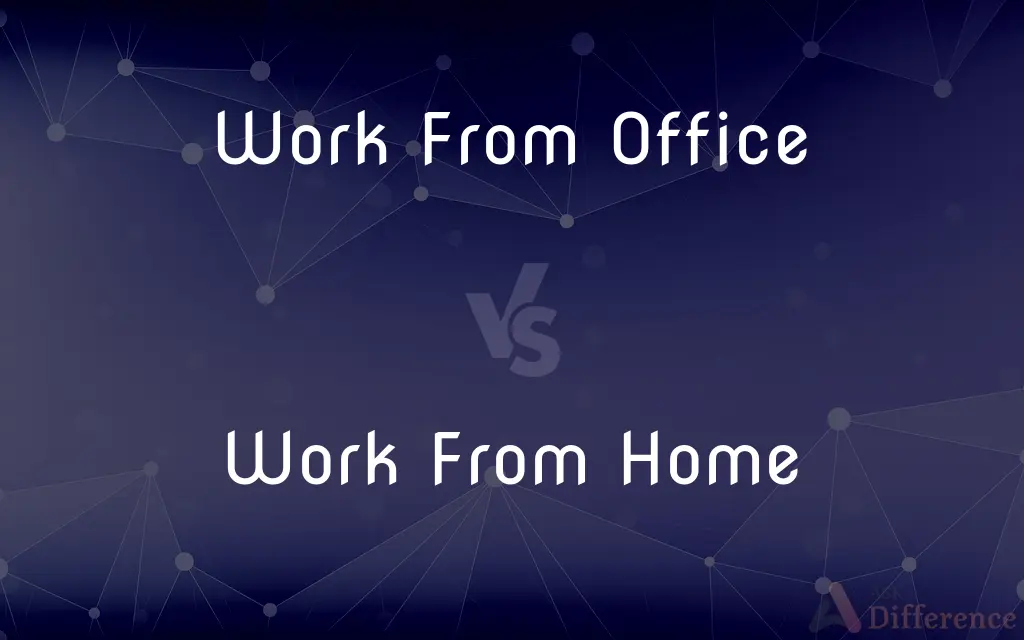Work From Office vs. Work From Home — What's the Difference?
By Tayyaba Rehman & Fiza Rafique — Published on October 16, 2023
Work from office refers to performing job duties in a designated company space, while work from home means executing tasks from a personal residence.

Difference Between Work From Office and Work From Home
Table of Contents
ADVERTISEMENT
Key Differences
Work from office typically involves commuting to a physical location, set up by the employer. Work from home allows employees to stay in their domestic settings while carrying out professional responsibilities.
The environment in work from office is often structured, with specific work hours, shared spaces, and direct supervision. In contrast, work from home provides flexibility in setting up one's workspace and might offer more adaptable work hours.
While work from office promotes face-to-face interactions, fostering team spirit and collaboration, work from home relies heavily on digital communication tools, requiring employees to be tech-savvy and self-disciplined.
One of the advantages of work from office is the clear distinction between professional and personal spaces. However, work from home can lead to blurred boundaries, but also offers comfort and can reduce commute-related stress.
Often, work from office comes with facilities like cafeterias, tech support, and ergonomic office furniture. Work from home demands individuals to create their conducive work environment, balancing comfort and productivity.
ADVERTISEMENT
Comparison Chart
Location
Designated company premises
Personal residence
Interaction
Face-to-face
Digital
Flexibility
Structured hours, less flexible
Often flexible hours
Workspace Provision
Provided by employer
Set up by individual
Boundaries
Clear distinction between professional and personal spaces
Can be blurred
Compare with Definitions
Work From Office
Access to company facilities.
His work from office allowed him to use the state-of-the-art gym.
Work From Home
Offers flexibility in work hours.
She could adjust her schedule easily while she chose to work from home.
Work From Office
Involves daily commuting.
The traffic made his work from office commute exhausting.
Work From Home
Executing job responsibilities from one's residence.
He started to work from home due to the pandemic.
Work From Office
Performing tasks at an employer's location.
After her vacation, she resumed her work from office routine.
Work From Home
Relies on digital communication.
Virtual meetings became the norm for her work from home position.
Work From Office
Collaboration in a physical space.
The team's work from office setup made brainstorming sessions lively.
Work From Home
Eliminates daily commuting.
He saved a lot on fuel expenses once he switched to work from home.
Work From Office
Distinct professional environment.
She preferred the focused atmosphere of her work from office setting.
Work From Home
Requires personal workspace setup.
His living room became his office when he began to work from home.
Common Curiosities
Where is work from office typically performed?
Work from office is typically performed at a designated company location or premises.
What is a significant advantage of work from home?
One significant advantage of work from home is eliminating the daily commute.
Which offers more flexible hours: work from office or work from home?
Work from home often offers more flexible hours compared to work from office.
How has the pandemic impacted the prevalence of work from home?
The pandemic greatly increased the prevalence of work from home as companies adapted to safety protocols.
Can work from home lead to blurred boundaries between work and personal life?
Yes, work from home can lead to blurred boundaries between professional and personal spaces.
Are company facilities more accessible in work from office or work from home?
Company facilities are more accessible in a work from office setting.
Which requires a more personal initiative in setting up a workspace?
Work from home requires more personal initiative in setting up a conducive workspace.
Which can lead to more distractions: work from office or work from home?
Work from home might lead to more distractions due to domestic settings, though it varies by individual.
Are all jobs suitable for work from home?
No, some jobs, especially those requiring physical presence or specialized equipment, might not be suitable for work from home.
How do interactions differ between work from office and work from home?
Work from office promotes face-to-face interactions, while work from home relies on digital communication.
Can work from home contribute to work-life balance?
Yes, work from home can contribute to work-life balance, but it also requires clear boundaries to prevent work from dominating personal time.
Does work from home demand greater self-discipline?
Yes, work from home often requires greater self-discipline due to less direct supervision.
Is it possible for companies to mix both work from office and work from home models?
Yes, many companies adopt a hybrid model, allowing both work from office and work from home options.
Which typically requires a daily commute: work from office or work from home?
Work from office typically requires a daily commute.
How do companies monitor work from home employees?
Companies monitor work from home employees using digital tools, periodic check-ins, and task-tracking software.
Share Your Discovery

Previous Comparison
Republic vs. Country
Next Comparison
ZIP vs. RARAuthor Spotlight
Written by
Tayyaba RehmanTayyaba Rehman is a distinguished writer, currently serving as a primary contributor to askdifference.com. As a researcher in semantics and etymology, Tayyaba's passion for the complexity of languages and their distinctions has found a perfect home on the platform. Tayyaba delves into the intricacies of language, distinguishing between commonly confused words and phrases, thereby providing clarity for readers worldwide.
Co-written by
Fiza RafiqueFiza Rafique is a skilled content writer at AskDifference.com, where she meticulously refines and enhances written pieces. Drawing from her vast editorial expertise, Fiza ensures clarity, accuracy, and precision in every article. Passionate about language, she continually seeks to elevate the quality of content for readers worldwide.












































